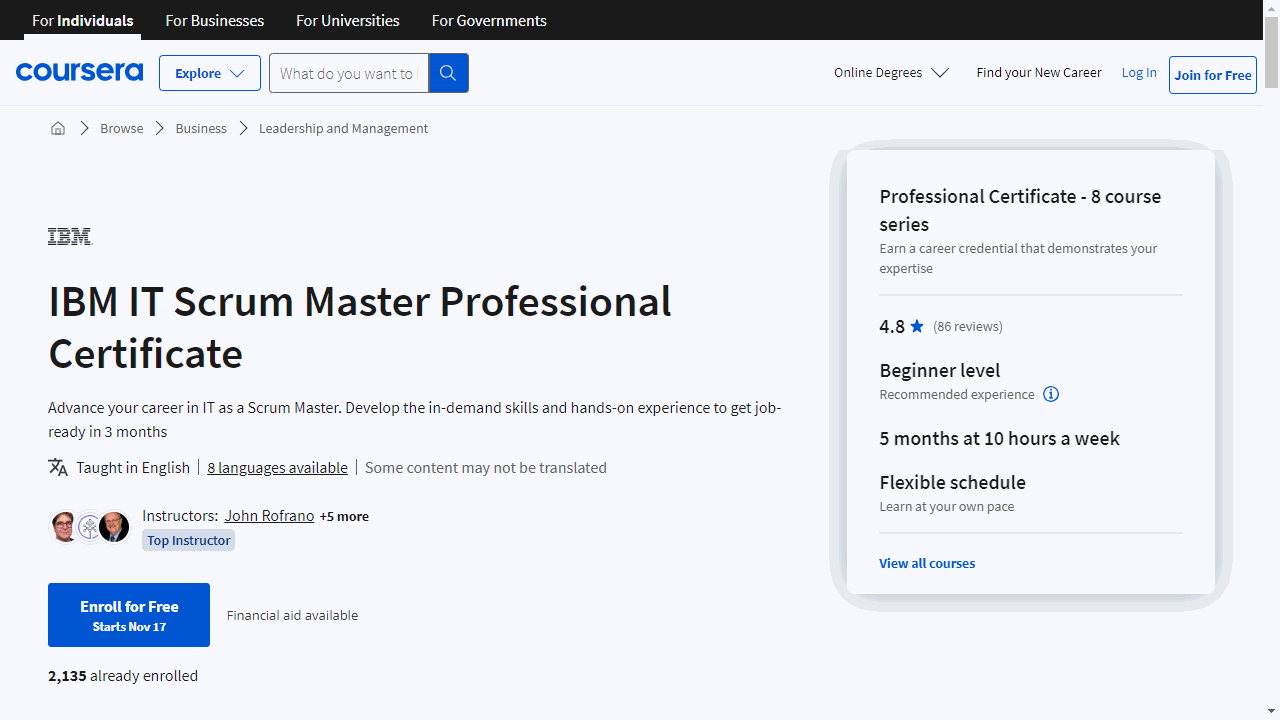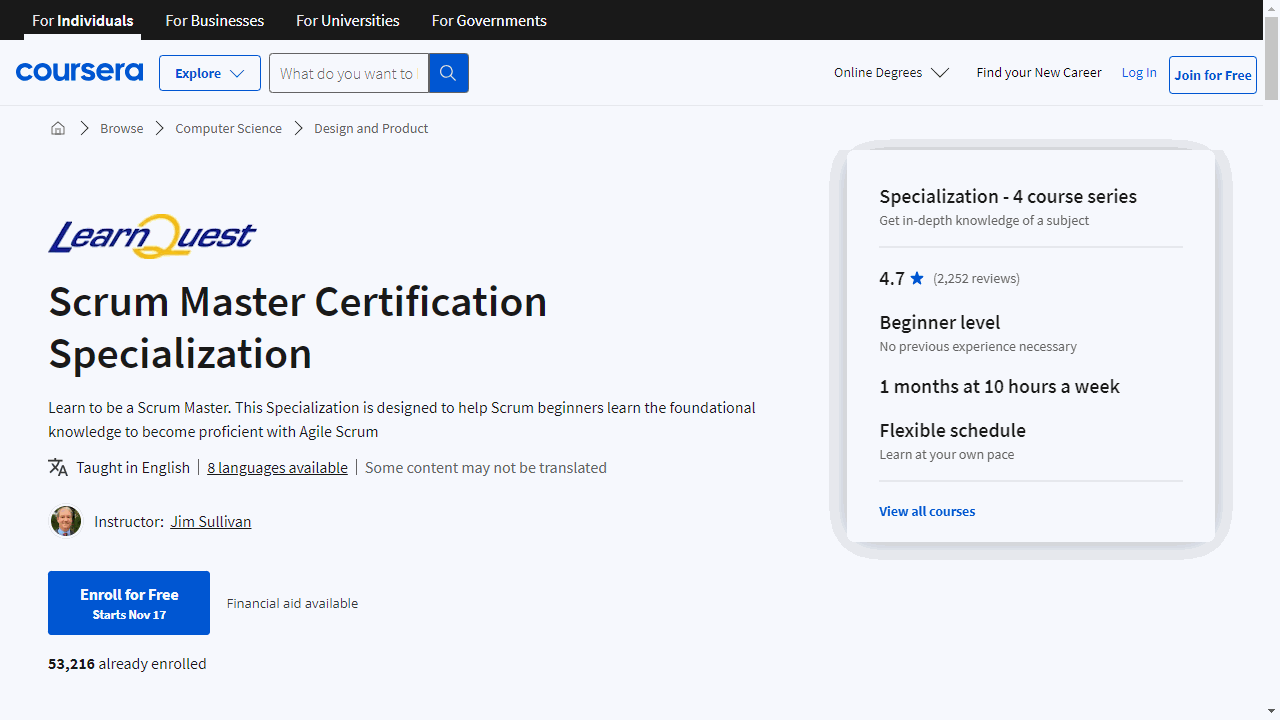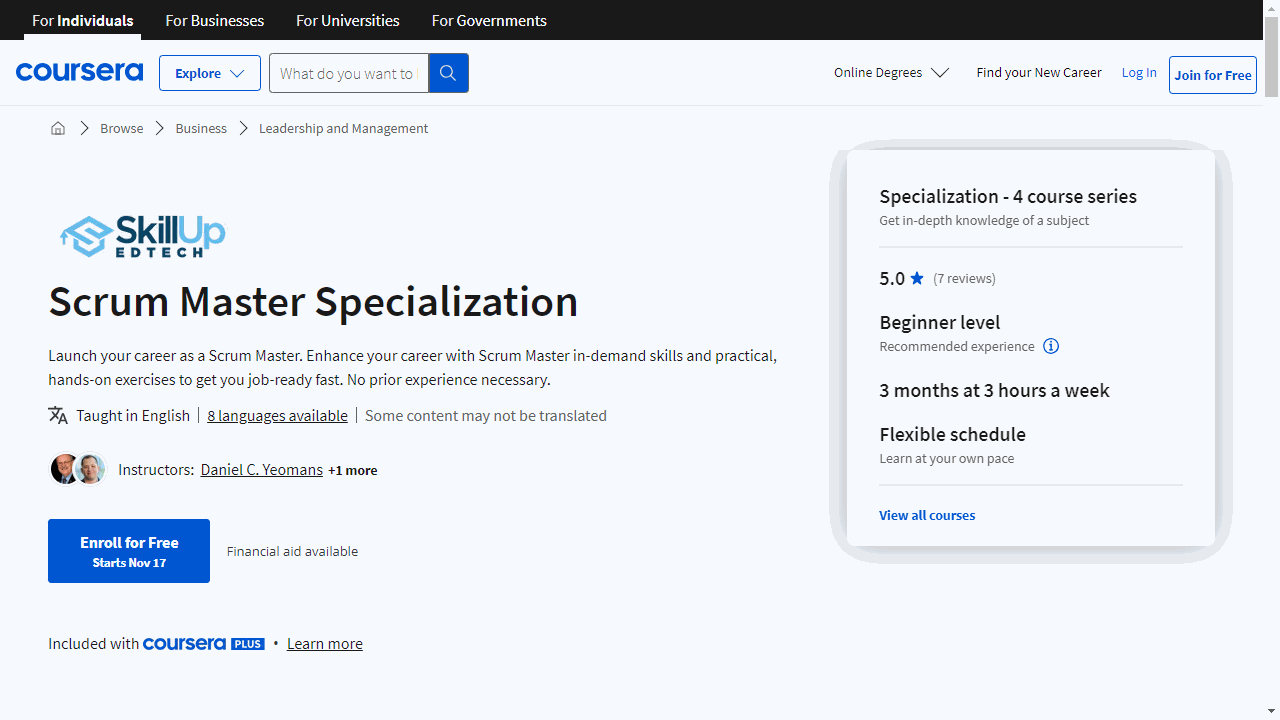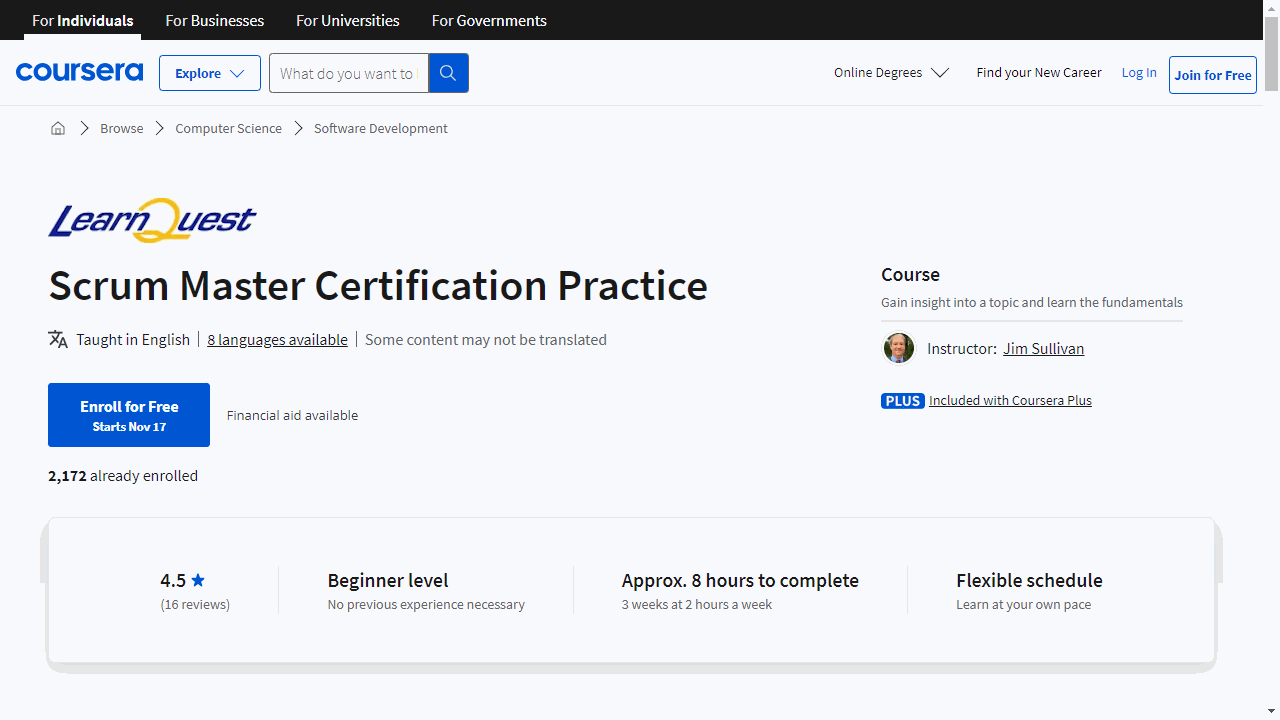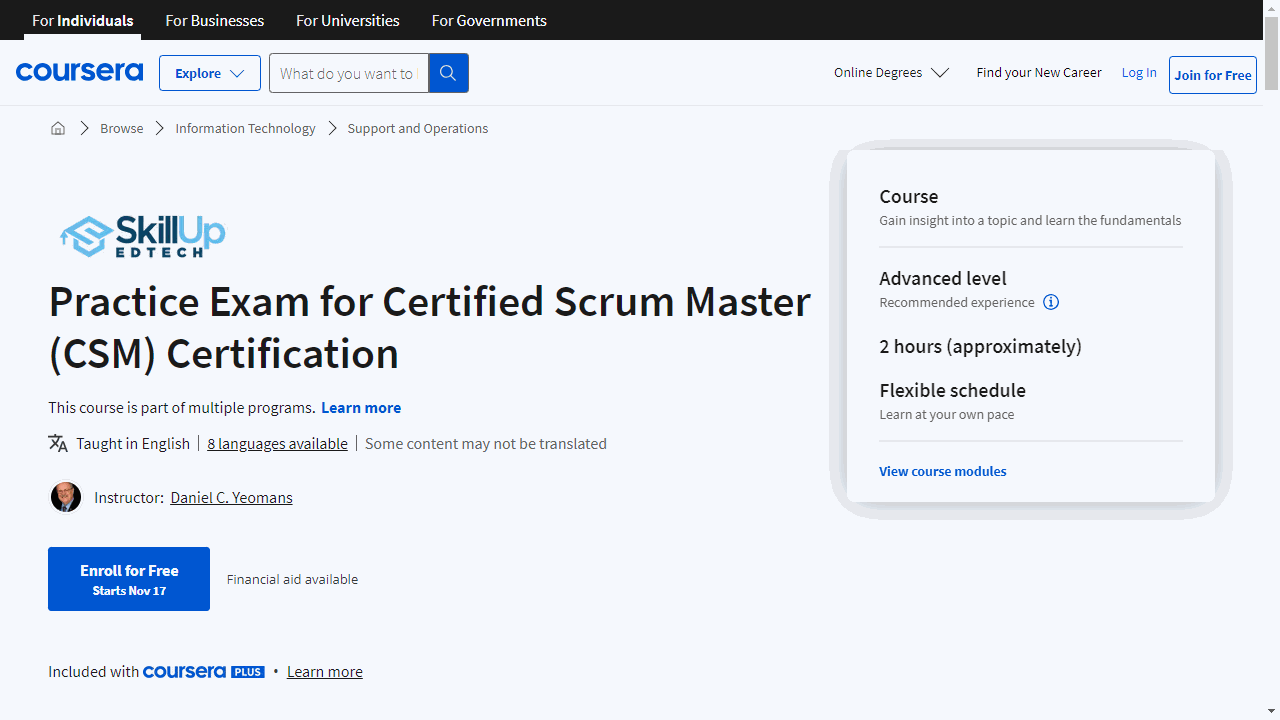Scrum is an agile framework used to manage complex projects, particularly in software development.
It focuses on iterative development, breaking down large projects into smaller, manageable chunks called sprints.
By embracing collaboration and continuous improvement, Scrum helps teams deliver value faster and adapt to changing requirements.
Learning Scrum can be immensely valuable for anyone involved in project management, from aspiring Scrum Masters to team members looking to improve their workflow.
Finding the right Scrum course on Coursera can be challenging, with so many options available.
You want a program that provides a comprehensive understanding of the framework, practical skills, and real-world applications, while fitting your learning style and goals.
For the best Scrum course overall on Coursera, we recommend the IBM IT Scrum Master Professional Certificate.
This program offers a comprehensive journey, covering the core principles of Scrum, the Scrum Master role, and how to apply Scrum in various IT contexts.
With engaging video lectures, interactive quizzes, and case studies, this certificate will equip you with the knowledge and skills to confidently manage projects using Scrum.
An added bonus is the opportunity to earn a professional certificate from IBM, a recognized leader in the IT industry.
While this is our top choice, there are other excellent options available.
Keep reading to discover more recommendations for different learning levels, focusing on specific Scrum roles, and even tailored to career goals.
IBM IT Scrum Master Professional Certificate
The IBM IT Scrum Master Professional Certificate on Coursera stands out for its comprehensive approach to mastering Scrum and Agile methodologies.
The journey begins with “Introduction to Scrum Master Profession,” which lays a solid foundation for understanding the Scrum Master role.
It’s an insightful course that explains the benefits and key skills needed for success, regardless of your background in project management.
For those less familiar with the technical side, “Information Technology (IT) Fundamentals for Everyone” demystifies IT concepts.
It’s an essential primer that equips you to work alongside IT teams, covering everything from hardware basics to cloud computing.
“Introduction to Software Engineering” expands your understanding of the software development process.
It’s not just about coding; you’ll delve into the software development lifecycle and get hands-on experience with programming, making it valuable for anyone interacting with software development teams.
The “Introduction to DevOps” course introduces you to the culture and practices of DevOps.
You’ll explore how to improve product development by integrating development with operations, emphasizing continuous integration and microservices.
“Introduction to Agile Development and Scrum” focuses on the Agile methodology and its implementation through Scrum.
You’ll learn to manage product backlogs, write effective user stories, and understand the dynamics of a Scrum team, all through practical, scenario-based learning.
“Working as a Scrum Master” dives deeper into the Scrum framework, offering a more nuanced understanding of the role.
You’ll engage with real-life scenarios that hone your ability to lead and collaborate effectively within a Scrum team.
The “Scrum Master Capstone” is where theory meets practice.
This course challenges you to apply your knowledge through real-world project scenarios, helping you build a portfolio that demonstrates your Scrum expertise.
Lastly, the “Practice Exam for Certified Scrum Master (CSM) Certification” course prepares you for the CSM exam with a realistic practice test.
It’s a focused review that ensures you’re ready to earn your certification and apply your skills professionally.
Scrum Master Certification Specialization
This series of courses is meticulously designed to build your expertise from the ground up, equipping you with the practical skills needed in the field of Agile and Scrum.
The journey begins with “Introduction to Scrum Master Training,” where you’ll establish a solid foundation.
You’ll learn to distinguish between Waterfall and Agile methodologies, understand the roles within a Scrum team, and manage the intricacies of a Sprint.
This course is essential for grasping the basics and setting the stage for more advanced concepts.
Moving forward, “Scrum Master Certification: Scrum Methodologies” delves deeper into the Agile framework.
You’ll explore the importance of User Stories, learn how to track and interpret Velocity, and understand the nuances of Backlog Refinement.
The course also introduces you to Scrum Reports, providing you with the tools to effectively manage risks.
For those looking to scale their Scrum knowledge, “Scrum Master Certification: Scaling Agile and the Team-of-Teams” is the logical next step.
This course is tailored for those who have mastered the basics and are ready to apply Scrum principles to larger, multi-team projects.
It’s a critical course for anyone aiming to manage complex initiatives with agility and precision.
Lastly, “Combining Scrum with Other Agile Methodologies” offers a nuanced look at integrating Scrum with other Agile practices.
This course is about fine-tuning your approach, ensuring that you can adapt and tailor your Scrum methodology to fit the unique needs of your team and projects.
Each course in this specialization is designed to be interactive and applicable, allowing you to put your new knowledge into practice immediately.
The flexibility of online learning means you can progress at a pace that suits your schedule and commitments.
Scrum Master Specialization
The “Introduction to Scrum Master Profession” course is an excellent starting point on your Scrum journey.
It doesn’t assume any prior project management experience, making it accessible to anyone interested in the field.
You’ll explore the Scrum Master’s role and discover why Scrum is so effective in today’s workplace.
The course also provides a realistic view of the job market, including potential salaries and certification paths like Scrum Alliance CSM, PMI-ACP, and PMI-DASM.
Moving on to “Working as a Scrum Master,” you’ll delve deeper into the Scrum framework.
This course emphasizes practical skills, such as creating Scrum Personas and fostering a collaborative team environment.
It’s designed to prepare you for the Advanced Certified Scrum Master (A-CSM) certification, ensuring you’re not just learning theory but also applying it in a way that’s recognized by industry standards.
The “Scrum Master Capstone” is where theory meets practice.
You’ll apply your accumulated knowledge to real-world scenarios, crafting essential Scrum artifacts and honing your project management skills.
This hands-on experience is invaluable, as it allows you to build a portfolio that demonstrates your readiness for more advanced Scrum responsibilities.
Lastly, the “Practice Exam for Certified Scrum Master (CSM) Certification” course is a focused prep tool for the CSM certification exam.
It offers a clear overview of the exam process and requirements, capped with a mock exam to test your readiness.
Scrum Master Certification Practice
This course is designed to equip you with the skills necessary to not only pass the certification exam but also to excel in real-world Scrum environments.
The course begins by setting the stage with an overview of the exam topics, ensuring you understand the journey ahead.
You’ll quickly move into the practical realm with a focus on the Backlog and Estimation.
Here, you’ll learn the art of creating and prioritizing backlogs through an interactive exercise that simulates real project scenarios.
Planning the Sprint is a critical skill for any Scrum Master, and this course takes it seriously.
You’ll get hands-on experience planning a two-week sprint, which is central to the Scrum framework.
The course also guides you through setting up a Kanban Board, a visual tool that helps track progress and streamline workflows.
Collaboration is key in Scrum, and this course fosters that through engaging discussion prompts.
You’ll delve into Product Backlogs and User Stories, adding Acceptance Criteria to ensure clarity and shared understanding within your team.
Execution is where theory meets practice.
The course introduces you to Test Driven Development, a technique that emphasizes quality and design.
You’ll also participate in assignments that mimic the rhythm of Daily Stand Ups and Continuous Integration, reinforcing the daily practices that keep a Scrum team on track.
Post-sprint activities are not overlooked.
You’ll explore the Backlog Refinement Meeting and the intricacies of Packaging and Deployment, planning for these essential steps to ensure your product’s success beyond the development phase.
The course also covers the Definition of Done, Sprint Review, and Sprint Retrospective, teaching you how to effectively close out a sprint and prepare for the next.
You’ll craft a Definition of Done, organize review and retrospective meetings, and create a readiness plan for upcoming sprints.
Throughout the course, you’ll populate a Sprint Events Calendar, which serves as a practical tool for managing your Scrum events and responsibilities.
This course stands out for its balance of theoretical knowledge and hands-on practice.
It’s structured to help you understand the Scrum framework deeply and apply it effectively.
Practice Exam for Certified Scrum Master (CSM) Certification
The Practice Exam for Certified Scrum Master (CSM) Certification course is exactly what you need to prepare for your CSM exam with confidence.
Starting with a comprehensive introduction, this course lays out the CSM landscape clearly, ensuring you understand the core concepts and domains of Scrum.
It’s not just about memorizing terms; it’s about grasping the principles that will guide your agile practice.
One of the standout features of this course is the section on exam testing strategies.
Here, you’ll learn how to approach the exam questions, manage your time effectively, and maintain your composure under pressure.
To put these strategies to the test, you’ll tackle a 20-question practice test designed to give you a taste of the real challenge.
The course is structured to maximize your learning experience.
It guides you on how to navigate the content efficiently, so you spend more time learning and less time figuring out where to go next.
Eligibility for the CSM exam is clearly explained, ensuring you meet all the necessary criteria before you invest your time and effort.
The course also provides a wealth of additional study resources and tips, giving you access to a variety of materials to support your learning journey.
“Check Your Readiness” is a thoughtful inclusion, acting as a self-assessment tool to gauge your preparedness for the exam.
It’s a helpful checkpoint to ensure you’re on the right track.
The mock test is a crucial component of the course, simulating the actual CSM exam environment.
This practice exam helps identify your strengths and areas for improvement, allowing you to focus your studies more effectively.
Clear exam instructions are provided to demystify the testing process, so you know exactly what to expect on the day of your exam, leaving no room for unwelcome surprises.
Upon completion, the course doesn’t just leave you with a pat on the back.
It offers guidance on next steps to further your Scrum education and career, showing a commitment to your long-term growth.
The course team’s sign-off with a thank you adds a personal touch, reinforcing their support for your success.
It’s not just about passing a test; it’s about building a foundation for a successful career in Scrum.
Also check our posts on:
